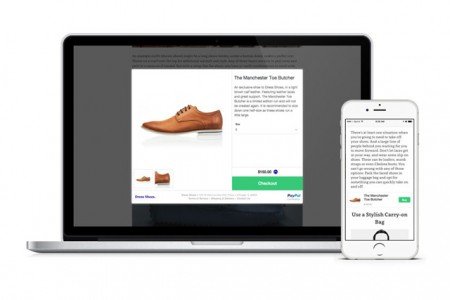PayPal adds new commerce tools to enable merchants integrate buy buttons across third-party apps.
PayPal has unveiled new commerce tools of PayPal Commerce service. Using these tools merchants will be able to add their buy button wherever they want -in email, social shares, blogs, articles, ads or apps. The service is open so buyers, who use the buy button tools for purchasing a product, will not necessarily need an account to make payments.
The service will be free for merchants and retailers. The new tools are based on the technology offered by startup Modest, which PayPal acquired in 2015.
“A seamless and secure way to sell where your products are first seen – in emails, blogs, articles, apps, social shares, and more – without changing the way you manage your business,” says the service description.
Online shopping, as we generally understand it, means purchasing on company’s official website. PayPal Commerce strives to transform this principle. It offers “omicommerce” as an alternative.
“For our partners, PayPal Commerce supplies core API building blocks used in the development of their own innovative commercial applications for their users,” says Harper Reed, Modest’s co-founder and head of commerce at PayPal’s Braintree.
PayPal states that the checkout experience will become more intuitive due to the fact that merchants will manage to choose the spot for their buy button by themselves. In general, payment processor has offered a one-step solution to spread the buy button. Merchants will also use PayPal’s network to settle transaction seamlessly.
At the end of 2015 holders of PayPal accounts got a possibility to send bitcoins worldwide thanks to partnership between Netherlands-based payment service provider Bitwala and PayPal. The launch of the feature has become a part of Bitwala’s strategy to make payment services available to all bitcoin users.
PayPal email address is the only thing necessary for funds transfer. The currency conversions are implemented by company itself, which sets its own exchange rates.
Bitwala CEO, Jörg von Minckwitz, once admitted that the company faced some legal problems while establishing the service. “Since we are dealing with PayPal and Bitcoin, the legal frame work was not clear. Now, our lawyers have given the go-ahead to release the new feature,” Minckwitz said. Besides, he unveiled the plans to expand the company’s services to Asia and Africa.
PayPal has recently taken measures against companies offering VPN and SmartDNS services due to violation of service terms. According to TorrentFreak, the company has blocked the Canadian company UnoTelly from getting payments, because these services help customers to bypass copyright restrictions. UnoTelly allows users to remove geo-blocks installed by streaming sites, including Netflix, Spotify and Hulu.
“Under the PayPal Acceptable Use Policy, it may not be used to send or receive payments for items that infringe or violate any copyright, trademark, right of publicity or privacy, or any other proprietary right under the laws of any jurisdiction,” PayPal said in an email sent to UnoTelly.
next